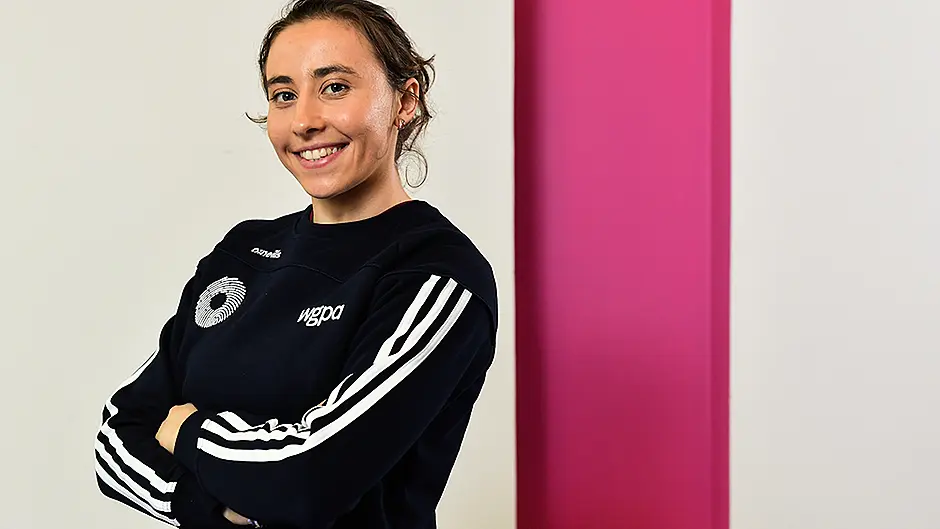Interview with Dohenys' and Cork footballer Melissa Duggan ahead of the Munster final
Dohenys’ Melissa Duggan is a pharmacy student in Dublin. During college months she travels from the capital to Cork twice a week for training – and has to pay her own way. KIERAN McCARTHY caught up with the Cork defender to talk trains, buses, lifts and the lack of expenses in ladies’ GAA
**********
TWICE a week when she is in college, Melissa Duggan has to cough up €32.38 on a student return train ticket from Dublin to Cork just so she can get to inter-county training.
On those train journeys alone, that’s almost €65 every week, and that doesn’t include her Luas or bus tickets.
The 23-year-old is a pharmacy student at the Royal College of Surgeons in Ireland (RCSI), who has just finished fourth year and has one more year left.
She is also an inter-county ladies’ footballer who receives no travel expenses whatsoever, unlike her male counterparts.
When Melissa pays for a train ticket to take her from Heuston Station in the capital to Kent Station in the real capital, that comes out of her own pocket. Ladies’ footballers don’t receive a penny in travel expenses. They don’t receive any expenses. If they have to travel by train to training, they pay for it. If they travel by car, they pay for their petrol. It’s their own money.
‘I don’t think people realise the journeys that we make to training and they might think that we do get expenses – but the reality is that we get nothing. That’s a shame,’ the Dunmanway woman says.
‘I’m a student and I make the trip down to Cork twice a week for training. That’s €65 on a train alone which, and any student will tell you, is a lot. That doesn’t include anything else, like the Luas or buses.’
Even though Melissa insists that she would fork out that money any day so she can train with Cork, she shouldn’t have to. At the very least, ladies’ players should break even, not have to spend their own money to play for their county.
‘I don’t think anyone should be out of pocket for representing their county,’ Cork boss Ephie Fitzgerald says.
‘That’s not sustainable. I do think there will have to be some sort of an amalgamation between ladies’ football and the GAA because with the crowds that come to ladies’ matches it’s just not sustainable. You can’t pay players expenses if you have small crowds at a match. I think double headers are the way to go.
‘It’s a slow process, I know, but that amalgamation would be good news for everyone.’
The Cork Ladies’ Football Board is very good to the team, Fitzgerald says. They want for nothing. But he still wants ladies footballers to receive expenses like ‘what the men get’.
Melissa’s is just one story. Before Rebel forward Áine Terry O’Sullivan moved to Cork city last year after getting a job with Johnson Controls, she drove the 300km round trip from Allihies at the tip of the Beara peninsula to the city for training a couple of times every week for six years. That’s thousands upon thousands of miles so she could train and play for her county. Áine Terry never received a penny in travel expenses. Leaving Cert student Clare O’Shea is another from Beara that makes that trip each week. Massive travel but massive commitment, too. That’s love for the game.
***
‘Ephie, I don’t think I’m going to make training. I’m on my way to Mallow on the train.’
It was 6.15pm on a Friday evening. Training was starting at the Mardyke at 7pm. Melissa is fast. But she’s not that fast.
‘You’re grand,’ Ephie laughed, ‘go away home for yourself.’
That Friday was a particular disaster. Melissa was at Heuston Station in plenty of time for the 5pm train to Cork city. But there was no sign of her usual train down home. She then spotted that the train to Tralee stopped off in Mallow so she jumped on. A last-minute decision.
The quickly-concocted plan was to get off in Mallow and get a connecting train to the city. But time was against her. It was one time Melissa had to concede defeat. She missed training.
She also has to miss college lectures in the RCSI too, especially for Wednesday evening trainings in Cork. For the last three years, since she’s been on the Cork panel, Melissa has her Wednesday routine.
To hop on the 4pm train from Heuston to Kent, she needs to leave college around 3pm, not any later. The RSCI is on St Stephen’s Green. The train arrives in Cork at 6.29pm. That gives her 31 minutes to get to training. Depending on the time of year, she has to get from Kent Station to UCC’s The Farm pitches, Páirc Uí Chaoimh or Cork IT. Either organise a lift or, dipping into her own money again, catch a bus. After training, her sister Aprille would be waiting for her.
‘She collects me after training and I stay with her on Wednesday nights. It’s a good job we get along because we see so much of each other!’ Melissa jokes.
Aprille lives in Frankfield near Grange. At 5.30am on Thursday morning she gets up to drive Melissa to the train station so she can get on the 6.15am back up to Dublin. She’ll arrive there at 8.30am and then it’s a quick scramble to get to her first class at 9am. It’s the bus or Luas, again.
Time management has had to become one of her strong points.
‘It never works out easy. I always have a nine o’clock start on a Thursday,’ she says.
There are times when the Cork defender can’t miss college for training. If she’s working on a research project she’s in the lab until 6pm. The Cork management understand. They trust her to train in Dublin.
Another year in college finished, she’s home for the summer now. Back in Ballyboy in Dunmanway and working in Drinagh Pharmacy in Skibbereen, her journey to training isn’t as intense as she is used to.
Instead of trains, the Luas, buses and Aprille’s lifts, Melissa is in control now with the drive from Skibb to the city.
‘It’s been tough alright up and down from Dublin but I am coming to the end of it now. I have one more year left in college and next year is mainly placement. Hopefully I’ll be in Cork city for that and it will save me travelling up and down to Dublin.’
She’s more time in the car now, but there’s no snacking. Chocolate is off the menu.
***
Melissa told The Southern Star before that eating six chocolate bars every week is good for your heart. Studies have shown this, she insisted. In the same interview she said that she can’t live without chocolate.
Nutritionist Anne McKiernan has come on board with the Cork ladies footballers this year to add her expertise as the Rebels look for those marginal gains. They want to close the gap on pace-setters and All-Ireland champions Dublin.
Cork did win the national league Division 1 title but the Dubs are the benchmark and the team to beat.
‘There are no chocolate bars now!’ Melissa laughs.
‘It’s great to have Anne on board and have that advice and help. Our set-up is very professional now and we are constantly improving on and off the pitch.
‘You need to eat the correct amount of food for all the training that we do. For the league we were training four nights a week so it’s important that you eat the right food, like protein after training to recover quicker.
‘You want to be the best and be as fit as you can and recover quick for the next match.’
Take a normal Wednesday and Friday with training in the evening, for example. For lunch Melissa would have some pasta for carbohydrates, vegetables and chicken. She’d aim to drink two to three litres of water on training days too. After training the players have food from bodychef.ie in Bishopstown; usually it’s chicken with rice and vegetables.
Chicken and pasta has become a stable part of Melissa’s diet. It’s the go-to food before matches as well.
So, no fast food, crisps, chocolates and sweets.
‘If it means we win an All-Ireland, I won’t mind,’ she says.
***
Cork will be one of the favourites for the All-Ireland. They’ve won the Division 1 league title already and Melissa was one of seven Rebels named on the Division 1 Team of the League. Now, Cork are in a Munster final against Waterford this Sunday evening at Fraher Field in Dungarvan. Cork are big favourites to defend their provincial title. And Melissa will have her role to play in the Cork defence.
Pound for pound, Ephie Fitzgerald says, she is one of the best defenders in the country. The Dohenys woman is someone you want in the trenches beside you if you go to war.
‘If you want someone to do a marking job for you, Melissa is that player,’ the Cork boss says.
‘She is tenacious, good on the ball and reads the game very well.’
West Cork ladies manager Brian McCarthy agrees. He has coached Melissa for the past three seasons and knows what she is all about.
She might seem quiet off the pitch – but don’t be fooled.
‘She’s one of the leaders in the West Cork team, she sets standards. Melissa has the ability to read what a forward’s going to do and works out how to counteract that but she is also a platform to launch attacks. Coming out of defence she plays the simple ball and the right ball,’ McCarthy says.
The West Cork woman started in the Cork full-back line in the county’s 3-22 to 0-7 thrashing of Waterford earlier in this Munster championship. Cork followed that up with a 3-16 to 0-9 win against Kerry. They are streets ahead of the other two counties in Munster right
now – but they can’t be complacent. They won’t be, Melissa stresses.
‘We were given stats that Cork haven’t won back-to-back Munster finals since 2012 so that will be in the back of our minds on Sunday. That will help give us an edge. We want two-in-a-row and that will be a big boost going into the All-Ireland campaign.
‘There are three cups we can win this year. We have the league won. Hopefully we can add the Munster title. Then the focus will turn to the All-Ireland series and we need to meet and better the high standards that Dublin have set.’
Cork is leaving no stone unturned, Melissa says, and she’s confident that they will all reap the rewards for their commitment and hard work this season.
Hopefully, they will. But still, no player should have to pay their own way to train and play for their county. All ladies’ footballers deserve better.









